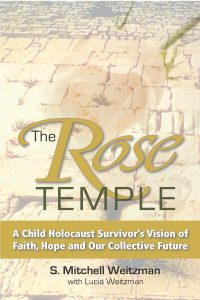About The Book
The Rose Temple is a dramatic account of the life and evolving vision of Lucia Weitzman (nee Rose Berl) who as a two-year-old Polish Jewish girl is taken in secret out of a Nazi-imposed ghetto and saved by a Catholic couple during the Second World War. Her birth parents are killed.
CONSEQUENCES OF A JEWISH-CATHOLIC DUAL IDENTITY
Lucia discovers she is Jewish after the War, at age five, when a relative comes to retrieve her and place her in a Jewish orphanage. She refuses to go, clinging to her adoptive parents. Moments later – the secret of her Jewish identity now revealed – her landlord hurls a brick at her while she is outside playing with a doll. It is a harbinger of things to come for her, the lone Jew remaining in her hometown for nearly twenty years after the War ends. All the while, she is a practicing Catholic who knows practically nothing about Jews or Judaism.
ESCAPING A BLEAK FUTURE
In her early twenties, anticipating a bleak future as a Jew in Poland, she contacts recently discovered American relatives. This draws the attention of Communist authorities, who arrest her. Released temporarily under the guardianship of her former high school headmaster, she escapes the county by boarding an overnight train bound for Vienna, Austria. In haste, she must, at age 21, leave her beloved adoptive parents and the life as she has known it behind.
TRANSITION TO A JEWISH LIFE…BUT SUPPRESSING HER FORMER LIFE
Lucia arrives in America in 1962 after brief stays in Israel and Belgium. Her relatives, Orthodox Jews, school her in Jewish practice and groom her for marriage to an Orthodox man. But she meets and marries a Jewish man who is not Orthodox. He alone in his family survived the War, and, though not Orthodox, in his own way he strives to honor his family’s rabbinic legacy. Lucia devotes herself to being a traditional Jewish wife and mother, raising two children in suburban Detroit. She suppresses her Christian understanding of Divine love, and a sense of her former spiritual self, in order to finally embrace a sense of belonging for her and her new family within the Jewish community.
A TRANSFORMATIVE NEW PHASE: A SPIRITUAL JOURNEY IS LAUNCHED
When her husband dies suddenly after a surreal European trip, all of her past and all of her inner longings come to the surface. She embarks on a soul-searching process that begins with confronting God at Jerusalem’s Western Wall. What happens next is wholly unexpected and transformative. She senses a Divine response to her challenge and delves into a spiritual, global journey that calls her to reject the conventional expectations of friends, family, and herself (such as remarrying) and to embark on a mission to understand the mystical experiences that begin to overwhelmingly populate her dreams, meditations, and inspirational writings. Through these symbols, she comes to understand who she really is and what her life purpose is all about.
MOTHER-SON COLLABORATION
The story is told by her son, Mitchell, who is both inspired by his mother’s experiences and emboldened to share its messages of struggle and perseverance; of submission and transformation; and of division and wishful unity, with the world.
ASKING WHERE GOD WAS DURING THE HOLOCAUST AND OTHER TRAGEDIES
For many children of the Holocaust, their faith in God was tested. Lucia Weitzman, born Jewish but raised Catholic, held steadfast to her faith yet asks, in The Rose Temple, about God’s presence during the Holocaust and other tragedies like 9/11. Through her spiritual quest, Lucia receives an answer that suggests we examine our presence and choices in God’s world as much as we question God’s presence in ours. More than just a Jewish story, readers of the Rose Temple will be inspired by Lucia’s battle to overcome adversity, her transformation to a spiritual messenger, and her call for universal religious tolerance.



